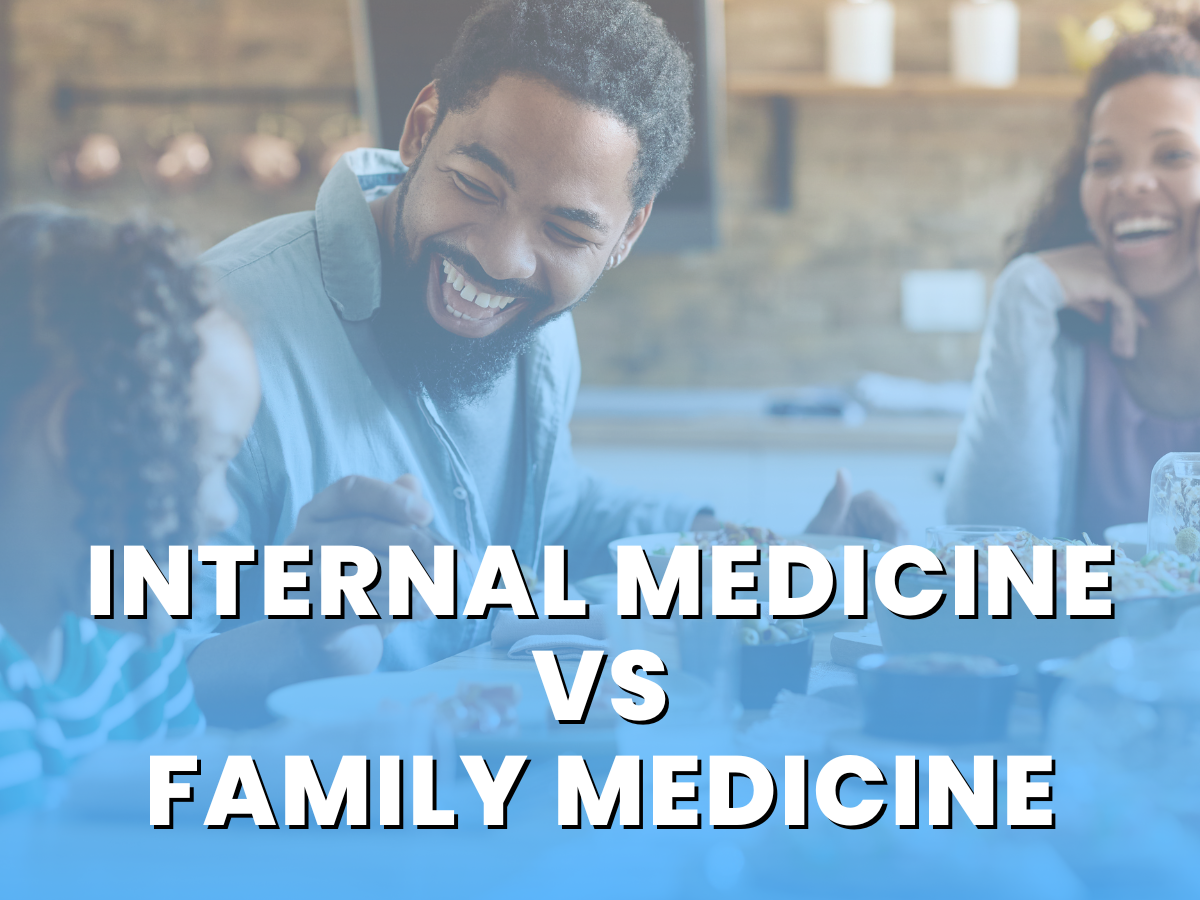In this article we would be focusing on internal medicine vs family medicine. The duel between the two would help determine the similarities and differences between the two.
Internal medicine is a medical specialty focused on the diagnosis, treatment, and prevention of adult diseases. Internal medicine physicians, also known as internists, are experts in the comprehensive care of adults, from young adulthood through old age. They are trained to manage a wide range of complex medical conditions, including chronic diseases, acute illnesses, and preventive care.
Internists often serve as the primary care provider for their patients, coordinating their overall healthcare needs. They have an in-depth understanding of the human body’s systems and how they interact, allowing them to provide holistic, patient-centered care. Internists are skilled at identifying and managing a diverse array of medical issues, from common conditions like high blood pressure and diabetes to more complex disorders such as autoimmune diseases and cancer.
One of the key aspects of internal medicine is the emphasis on lifelong learning and staying up-to-date with the latest advancements in medical research and treatment. Internists are committed to continuously expanding their knowledge and expertise to provide their patients with the most effective and evidence-based care.
What is Family Medicine?
Family medicine is a medical specialty that focuses on the comprehensive and continuous care of individuals and families across all age groups, from newborns to the elderly. Family medicine physicians, also known as family practitioners, are trained to address a wide range of health concerns, from acute illnesses and injuries to chronic conditions and preventive care.
Unlike internists, who specialize in adult medicine, family medicine physicians are trained to provide care for patients of all ages, from infants to the elderly. They play a vital role in the healthcare system, serving as the primary care provider for entire families and communities. Family medicine physicians are skilled in managing a diverse range of medical issues, from routine check-ups and vaccinations to complex chronic diseases and mental health concerns.
The cornerstone of family medicine is the patient-centered, holistic approach to care. Family medicine physicians strive to understand the unique needs and circumstances of each patient, taking into account their physical, emotional, and social well-being. They work closely with their patients to develop personalized treatment plans and promote overall health and wellness.
Key Differences between Internal Medicine Vs Family Medicine
While both internal medicine and family medicine are primary care specialties, there are some key differences between the two:
- Patient Population:
- Internal medicine focuses on the care of adult patients, typically from young adulthood to the elderly.
- Family medicine provides comprehensive care for patients of all ages, from newborns to the elderly.
- Scope of Practice:
- Internists have a deeper focus on the diagnosis and management of complex adult medical conditions.
- Family medicine physicians have a broader scope of practice, covering a wide range of medical issues across the lifespan.
- Training and Education:
- Internal medicine training involves a 3-year residency program specifically focused on the care of adult patients.
- Family medicine training involves a 3-year residency program that covers the care of patients of all ages, from pediatrics to geriatrics.
- Continuity of Care:
- Family medicine physicians often serve as the primary care provider for entire families, maintaining long-term relationships and continuity of care.
- Internists may have a more specialized focus, but they still play a crucial role in coordinating their patients’ overall healthcare needs.
- Subspecialties:
- Internists have the opportunity to pursue additional subspecialty training in areas such as cardiology, gastroenterology, or endocrinology.
- Family medicine physicians may also pursue additional training in areas like sports medicine, obstetrics, or geriatrics, but they typically maintain a broader scope of practice.
Scope of Practice for Internal Medicine Physicians
Internal medicine physicians are experts in the diagnosis and management of a wide range of adult medical conditions. Their scope of practice includes, but is not limited to:
- Chronic diseases: Diabetes, hypertension, heart disease, chronic obstructive pulmonary disease (COPD), and others
- Acute illnesses: Pneumonia, urinary tract infections, influenza, and other acute conditions
- Preventive care: Routine check-ups, cancer screenings, immunizations, and health promotion
- Complex medical conditions: Autoimmune disorders, neurological conditions, and multisystem diseases
- Coordination of care: Collaborating with specialists and other healthcare providers to ensure comprehensive patient care
Internists are highly skilled in interpreting diagnostic tests, such as laboratory results, imaging studies, and electrocardiograms, to accurately diagnose and manage their patients’ medical conditions. They are also trained in the appropriate use of medications, including the management of polypharmacy and potential drug interactions.
Scope of Practice for Family Medicine Physicians
Family medicine physicians are trained to provide comprehensive and continuous care for patients of all ages, from newborns to the elderly. Their scope of practice includes:
- Preventive care: Routine check-ups, health screenings, immunizations, and health promotion
- Acute care: Treatment of common illnesses and injuries, such as colds, flu, sprains, and minor lacerations
- Chronic disease management: Diabetes, hypertension, heart disease, asthma, and other chronic conditions
- Pediatric care: Well-child visits, developmental assessments, and treatment of common childhood illnesses
- Geriatric care: Management of age-related conditions, such as dementia, frailty, and polypharmacy
- Women’s health: Routine gynecological exams, prenatal and postnatal care, family planning, and menopausal management
- Mental health: Diagnosis and management of common mental health conditions, such as depression and anxiety
Family medicine physicians are skilled in providing holistic, patient-centered care, addressing the physical, emotional, and social needs of their patients. They often serve as the primary care provider for entire families, maintaining long-term relationships and ensuring continuity of care.
Training and Education Requirements for Internal Medicine vs Family Medicine
Internal Medicine:
- Undergraduate degree (4 years)
- Medical school (4 years)
- Internal medicine residency (3 years)
- Potential for additional subspecialty fellowship training (1-3 years)
Family Medicine:
- Undergraduate degree (4 years)
- Medical school (4 years)
- Family medicine residency (3 years)
- Potential for additional fellowship training in areas like sports medicine or geriatrics (1-2 years)
Both internal medicine and family medicine physicians must complete a rigorous educational and training process to become licensed and board-certified in their respective specialties. The key differences lie in the focus and scope of their residency training programs.
Internal medicine residents primarily focus on the care of adult patients, with a deeper dive into the diagnosis and management of complex medical conditions. Family medicine residents, on the other hand, receive training in the comprehensive care of patients across the lifespan, from pediatrics to geriatrics.
Pros and Cons of Choosing Internal Medicine as a Specialty
Pros:
- Opportunity to develop expertise in the diagnosis and management of complex adult medical conditions
- Potential for sub specialization in areas like cardiology, gastroenterology, or endocrinology
- Intellectual challenge and continuous learning
- Ability to establish long-term relationships with patients and coordinate their overall healthcare needs
Cons:
- Narrower patient population focus, primarily on adult patients
- Potential for higher levels of stress and burnout due to the complexity of cases
- Less exposure to pediatric and geriatric care
- Potentially more limited opportunities for procedural skills development
Pros and Cons of Choosing Family Medicine as a Specialty
Pros:
- Opportunity to provide comprehensive, lifelong care for patients of all ages
- Ability to develop strong, long-term relationships with patients and their families
- Broader scope of practice, including pediatric, adult, and geriatric care
- Potential for additional training in areas like sports medicine or obstetrics
- Opportunity to work in a variety of healthcare settings, including private practices, community health centers, and rural areas
Cons:
- Potentially less depth of expertise in the management of complex adult medical conditions compared to internal medicine
- Broader scope of practice may require more generalist knowledge rather than subspecialty expertise
- Potential for higher patient volume and more diverse clinical responsibilities
- May require more frequent on-call duties and weekend/evening coverage
Choosing between Internal Medicine vs Family Medicine as a Patient
As a patient, the choice between internal medicine and family medicine as your primary care provider may depend on your individual healthcare needs and preferences. Here are some factors to consider:
- Age and Lifecycle Stage:
- If you are an adult seeking comprehensive care for a specific medical condition or complex health needs, an internal medicine physician may be a good fit.
- If you are looking for a provider who can care for your entire family, from newborns to the elderly, a family medicine physician may be the better choice.
- Continuity of Care:
- Family medicine physicians often establish long-term relationships with their patients and their families, providing a sense of continuity and personalized care.
- Internists may have a more specialized focus, but they still play a crucial role in coordinating their patients’ overall healthcare needs.
- Scope of Services:
- If you require a broader range of services, from pediatric care to geriatric care, a family medicine physician may be better equipped to meet your needs.
- If you have a specific, complex medical condition that requires more specialized expertise, an internal medicine physician may be the better option.
Ultimately, the choice between an internal medicine or family medicine physician should be based on your individual healthcare needs, personal preferences, and the availability of providers in your local area. It’s important to have open discussions with potential providers to ensure that they can best meet your healthcare goals and expectations.
Book a Call Today!
Conclusion
Internal medicine vs family medicine are both essential primary care specialties. Each with its unique focus and approach to patient care. While internists specialize in the comprehensive care of adult patients. Family medicine physicians are trained to provide lifelong, holistic care for individuals and families across all age groups.
The choice between these two specialties may depend on your specific healthcare needs, personal preferences. By understanding the key differences between internal medicine and family medicine. You can make an informed decision about the primary care provider. Who can best meet your healthcare goals and ensure your long-term well-being.










